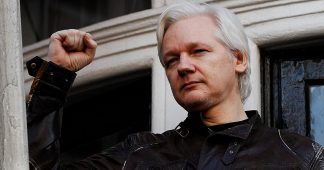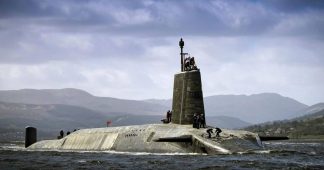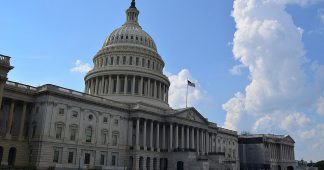ByYunus Soner
Mar.23, 2021
On March 16th, the British Government has published a report titled “Global Britain in a competitive age: The Integrated Review of Security, Defence, Development and Foreign Policy”. The report begins with a forward by the Prime Minister Boris Johnson and was presented to the British Parliament.
The government has started work on the report, shortened as “Integrated Review”, early 2020 and included contributions of different government agencies, parliamentary committees, and international allies as well as national and international experts, as outlines the Appendix B of the report.
The report therefore reflects a government consensus. It declares to be a “guide for action” for government. The Integrated Review sets out the UK Government’s objectives for defence, security and foreign policy until 2025, focusing on becoming a prosperous and resilient nation with a global perspective.
We’ve just published the #IntegratedReview.
Here are some of the things it commits us to ⬇️
[THREAD 1/7]
— UK Prime Minister (@10DowningStreet) March 16, 2021
The Review states that “a new world is emerging” (Page 3 – all page numbers from the Integrated Review unless indicated otherwise) defined by multipolarity, rising competition and geopolitical and geoeconomic shifts.
While Russia and China are Britain’s main competitors, Middle Powers and the European Union also have potential to enter a competitive relationship. These competitions are expected to “test the line between peace and war” (28)
The Review outlines a responsive policy that includes domestic government reorganization, defence adjustment including increased nuclear deterrence, domestic legislation as well as globally active interventionist steps.
All in all, the British Government prepares for war.
Post-Cold war system is over – the multipolar world has emerged
The Review makes the following, fundamental statement:
“The Integrated Review also signals a change of approach (emphasis in original text). Over the last decade, UK policy has been focused on preserving the post-Cold War ‘rules-based international system’ which has greatly benefited the UK and other nations. Today, however, the international order is more fragmented, characterised by intensifying competition between states over interests, norms and values. A defence of the status quo is no longer sufficient for the decade ahead.” (11)
The British Government declares that the US lead, Britain-supported order has come an end and that the UK now has to “demonstrate that its match-fit” for a different world. (3 – Foreword from the Prime Minister)
Global Britain in a competitive age | UK in a changing Europe https://t.co/GJj2dgiDEw
— Julie Hickmott 3.5% ?? #RejoinEU ? ? ? (@juliehinukeu) March 18, 2021
This world is defined by “geopolitical and geoeconomic shifts, systemic competition, rapid technological change and transnational challenges” (17).
“Systemic competition“
“In a multipolar world, there will be a growing contest between states and groups of states to shape the international environment”, states the British government in is report and says that competition takes place on the following areas:
– Between political systems;
– To shape the international order;
– To dominate land, sea, air space and the cyberspace;
– And to gain a greater share of global economic growth. (28f)
The statement of systemic competition is the acknowledgement of the loss of dominance. During the Post-Cold War period, the US and its main allies dominated these fields. Now, they are an issue of conflict.
The British Government states that this competition will be led by all means.
Economic Statecraft
The Integrated Review expects that competitors “will adopt economic statecraft as a lever in systemic competition. As well as greater protectionism and economic nationalism, this will sometimes include the deliberate use of economic tools – from conventional economic policy to illicit finance – to target and undermine the economic and security interests of rivals.” (29)
Rising regional conflicts
“Growing conflict and instability” will be the rule in 2030, because “driven by systemic competition, external powers will likely remain involved in national and regional conflicts, influencing their course in pursuit of their own advantage. This will increase risks of conflicts escalating.” (29)
Military conflict for domination will continue, but as “economic statecraft, cyber-attacks, disinformation and proxies” became common additional tools, the “systemic competition will test the line between peace and war.” (28)
Main competitors: Russia, evolving from ‘hostile state activity’ to ‘state threat’
It comes as no surprise that Russia is mentioned several times as “the most acute threat to the UK” throughout the Integrated Review (18, 20, 71, 85). The difference lies that this review does not target specific actions of Russia, such as its “annexation of Crimea”, but the Russian government itself. This is reflected in describing the country as a “state threat” in a general way.
The Review states concerning Russia the following:
“The UK respects the people, culture and history of Russia. However, until relations with its government improve, we will actively deter and defend against the full spectrum of threats emanating from Russia.” (61)
The UK does not “respect” the government of Russia, and it considers the country to be producing “a full spectrum of threats”.
Hence, the UK government addresses with the majority of measures described below the competition with Russia.
Main competitors: China “the biggest state threat to UK economic security”
The UK government makes the biggest change in its global strategy in terms of its evaluation of China. The following table compares the evaluation in the 2015 National Security Strategy Review (left) with the current one, in order to better display the change.
Comparison of Britisg approach to China in national security documents 2015 and 2021:
| 5.74 Our relationship with China is rapidly expanding. We do not expect to agree with the Chinese Government on everything. In all our dealings we will protect the UK’s interests vigorously. But our aim is to build a deeper partnership with China, working more closely together to address global challenges, including climate change, AMR, terrorism, economic development in Africa, peacekeeping, and to counter North Korea’s nuclear programme. We strongly support China’s greater integration into more of the world’s key institutions and organisations as its global role and responsibilities grow. The UK and China will establish a high level security dialogue to strengthen exchanges and cooperation on security issues such as non-proliferation, organised crime, cyber crime and illegal immigration. We will work together to strengthen cooperation on settling international and regional disputes peacefully in accordance with the UN Charter and international law. | China’s growing international stature is by far the most significant geopolitical factor in the world today, with major implications for British values and interests and for the structure and shape of the international order. The fact that China is an authoritarian state, with different values to ours, presents challenges for the UK and our allies. (…) China and the UK both benefit from bilateral trade and investment, but China also presents the biggest state-based threat to the UK’s economic security. We will require a robust diplomatic framework for this relationship that allows us to manage disagreements, defend our values and preserve space for cooperation where our interests align. We will continue to pursue a positive economic relationship, including deeper trade links and more Chinese investment in the UK. At the same time, we will increase protection of our CNI, institutions and sensitive technology, and strengthen the resilience of our critical supply chains, so that we can engage with confidence. |
| National Security Strategy and Strategic Defence and Security Review 2015, published November 2015, P. 58. | Integrated Review, P. 62 |
The 2015 Review does not even mention the key issues of Xinjiang, Hong Kong or Taiwan.
In 2021, China has become a “systemic competitor” (26) and “the biggest state threat” (62), and the current Review seems to present a strong contradiction:
Chatham House targets China, India, Turkey, Russia and Saudi Arabia at the same time
On the one hand, the UK government wants “to pursue a positive economic relationship, including deeper trade links and more Chinese investment” (62).
On the other, the UK shall “intervene in FDI transactions to protect national security” (52), “strengthen resilience of supply chains” (62) and “stand up for values” for instance in the cases of Xinjiang and Hong Kong.
Moreover, as an authoritarian state that is a systemic competitor, China is placed on the opposite side of global “ideological competition between different types of political system” (28).
What seems to be a contradiction is in fact a new methodology. “Standing up for values” or displaying military presence is the means of realizing the “positive economic relationship”, i.e., gaining more of China’s wealth.
Increasing area of competition: the Indo-Pacific
China’s wealth in turn draws attention to the rising completion field, the Indo-Pacific, and UK’s third competitor, which is mentioned in the review rather between lines: The European Union.
The review states:
“Shifts in the global balance of economic power. Drivers of growth in the global economy are likely to continue moving to the south and east, in particular the Indo-Pacific region.” (26)
Hence, the review dedicates a whole chapter titled “The Indo-Pacific tilt: a framework”, outlining UK’s focus on “economic opportunities, security and values” (66)
And a new competitor: the European Union
The Indo-Pacific will be an area where the UK “will look for ways to work more closely with European Partners, including France and Germany” (66), but always in the leading position:
“In the decade ahead, the UK will deepen our engagement in the Indo-Pacific, establishing a greater and more persistent presence than any other European country. The region is already critical to our economy and security, is a focal point for the negotiation of international laws, rules and norms and will become more important to UK prosperity over the next decade.” (62)
BREXIT is considered an “opportunity to follow different economic and political paths where this is in our interests, and to mark a distinctive approach to foreign policy”, especially to be “well-placed to take advantage of emerging markets, shifts in the global economy” (60.)
Hence, both intensive focus of the UK on the Indo-Pacific and a competitive-cooperative relation with the EU in that region is to be expected.
Preparing Britain to competition: Government reform, domestic adjustment, raising nuclear threat, increased international political intervention and military presence
The UK government acknowledges in its Integrated Review the loss of global US-shared hegemony and the beginning of competition to shape the future world order. This is not less than an imperialist wake up call, and it leads to a complete review of Britain’s standings.
The UK Government’s preparations to global competition can be summarized with the following 5 points:
1. Government reform
2. Domestic preparation
3. Raising nuclear threat
4.Increased international military presence and
5. Increased international political intervention
The spirit of the Integrated Review and the planned adjustments indicate that the UK government is preparing itself, its society and its military to a major conflict escalation on global level, if not outright to war.
“At the heart of the Integrated Review is an increased commitment to security and resilience”, says the government report, declaring to “accept the risk that comes with our commitment t global peace and stability” (11)
1. Institutional government reform
Within an “integration across government”, the Review proposes “bringing together defence, diplomacy, development, intelligence and security, trade and aspects of domestic policy” within the framework of the 2018 Fusion Doctrine. (19)
A Foreign, Commonwealth and Development Office (FCDO) is created as well as a Counter Terrorism Operations Centre, a National Cyber Force and a Situation Centre.
The Integrated Operating concept proposes more governmental integration on security measures, while the Review also underlines that the distinction between economic and national security becomes “increasingly redundant” (19). Hence, an “updated investment strategy” to control better Foreign Direct Investment into the UK according to national security needs is also announced. (52)
In sum, government organization is expected to be more centralized and more focused on national security and international competition.
Interestingly, the Review follows the path of so-called authoritarian states, declaring “adversaries and competitors are already acting in a more integrated way” (19).
2. Domestic preparation
The UK government announces preparations on domestic level that sound pretty totalitarian: “a whole-of society approach” (22), “a whole-of government approach” (74) is needed against so-called state threats, that is, in the competition with Russia and China.
The Defending Democracy program shall “protect UK institutions and elected officials from intimidation, interference and espionage” (74). The British government announces new controls on electoral systems, voter’s registration and campaigning in coordination with the other G-7 countries, obviously in defence against possible pro-Russian or pro-Chinese influences.
The UK government strengthens control over society in favor of national security too: “We will reform laws, policies and practices to remove impediments to the protection of national security” and “introduce Counter-State Threats legislation” (74) This legislation is announced “to criminalize harmful activity conducted by, and on behalf of, states.” (75)
Bills are also announced to “counter disinformation at home”(75).
All in all, the UK government tightens control over society with the goal of a united stand against international competitor, a policy that pretty much resembles the Cold War, where even simple pacifistic movements were considered pro-Soviet and thus a national threat.
3. Raising nuclear threat
Another major decision announced in the Integrated Review concerned the nuclear deterrence and received great international resonance. The UK government revised the former decision to decrease the number of nuclear warheads and decided to increase the number. The Review states:
“In 2010 the Government stated an intent to reduce our overall nuclear warhead stockpile ceiling from not more than 225 to not more than 180 by the mid-2020s. However, in recognition of the evolving security environment, including the range of technological and doctrinal threats, this is no longer possible, and the UK will move to an overall nuclear weapon stockpile of not more than 260 warheads.” (76)
Instead of decreasing the limit from 225 to 180, the new policy increased the limit to 260 warheads.
4. Increased international military presence
In parallel to the raised nuclear threat, the UK Government announces an increased international military presence too.
Accompanied by a rise of 24 billion pounds in the defence budget, the Review introduces the concept of “persistent engagement”, defined as “seamlessly moving between ‘operating’ and ‘warfighting’” (73).
The UK will continue to be at the “forefront of NATO’s new Deterrence and Defence concept”, deploying “more equipment” to Germany (72).
“Significant investment” will be made to the military base in Cyprus, and also to the bases in Gibraltar, Germany, Oman, Singapore and Kenya. As a perspective, the Review states, “the UK will deploy more armed forces overseas more often and for longer periods of time” (75).
The UK will also continue to build up Ukraine’s armed forces, says the Review, while military activity in the Indo-Pacific will increase through new security agreements and the visit of a carrier group led by the Aircraft carrier HMS Elizabeth.
5. Increased international political intervention
The UK government announces also increased political intervention into domestic affairs of countries especially in the wider European neighborhood, East Africa and the Indo-Pacific.
Here again support is given is to “open societies” against the “authoritarian” competitors. The Review states “the UK will (…) worldwide protect democratic values, (…) this will involve working bilaterally with countries to strengthen their domestic governance and to build the resilience against threats” (47).
The Review announces political intervention openly:
“To promote effective and transparent governance, robust democratic institutions and the rule of law. The UK will support strong, transparent and accountable political processes and institutions overseas, including parliaments and political parties, through the Westminster Foundation for Democracy.” (48)
This is of course a kind of activity that, if directed by others against the UK, would constitute a breach of national security.
Within context of cooperation with foreign parliaments and political parties, the establishment of a second sanctions regime against corruption in 2021 is announced by the Review, implicitly targeting those parties and political figures, which do not cooperate.
Besides maintaining all so-called soft power tools, where among others the BBC is also named, the Review announces the support to “independent media especially in Russia’s near abroad”. (75)
Summarizing theses
The UK government report can be summarized with the following theses:
1. By stating the end of the Post-Cold War-Order, Britain acknowledges that the Euro-Atlantic system has lost global hegemony.
2. Britain insists on an economic model based on exploiting global markets, resources and labor, and therefore states a global competition.
3. The UK considers this competition as existential, reflected in labeling competitors as “state threats”.
4. Britain’s main competitors are Russia and China, and there are indications that the European Union might turn in future into a major competitor too.
5. Geographical areas of competition are the wider European Neighborhood around Russia and the Mediterranean, and the Indo-Pacific around China.
6. The competition is “systemic”, that means, it covers aspects from national security, economic wealth, to governance, cyberspace and space. In other words, it is totalitarian.
7. The UK government prepares domestically a totalitarian, rally-around-the-flag reform for the global competition that includes governmental reorganization and enhanced control over society.
8. Besides increasing nuclear threat, the UK government plans to increase political and military intervention in both geographical competition areas.
9. The British government’s evaluation of competition, its totalitarian preparation in domestic policies and interventionist approach in foreign policy raise the risk for major armed conflict in the wider European Neighborhood and the Indo-Pacific.
Published atunitedworldint.com











